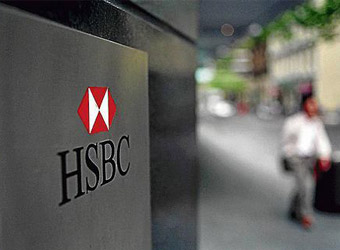HSBC Bank has said it is considering moving its headquarters out of the UK.
The bank said the review followed “regulatory and structural reforms” since the financial crisis.
HSBC’s board has asked its management to “look at where the best place is for HSBC to be headquartered in this new environment,” the bank said.
“The question is a complex one and it is too soon to say how long this will take or what the conclusion will be; but the work is under way.”
Shares in the company closed the day ahead by 2.86% after the news.
HSBC has not yet said where it may consider moving its headquarters to, although many expect Hong Kong to top the list.
‘Big and sprawling’
“The only even faintly credible option is Hong Kong,” said Alex Potter, banking analyst at Mirabaud Securities.
“HSBC is so big and sprawling,” said former banker and author Philip Augar. “Would Hong Kong wish to have a bank this big on its balance sheet?”
But the Hong Kong Monetary Authority has said that it would welcome HSBC back to Hong Kong. “HSBC is the largest bank in Hong Kong and has deep historical links with Hong Kong,” it said in a statement.
However, a move to Hong Kong may not necessarily help the bank cut costs.
“HSBC will pay several hundred million dollars more in tax in 2015 [if it stays in the UK], but it would cost several hundred millions of dollars to move the bank to another country,” says Mr Potter.
And “the Chinese government may prove to be less predictable than the UK’s,” he added.
Analysis: Kamal Ahmed, BBC business editor
Regulatory pressure, political attacks following revelations of errant behaviour and hefty new taxes have sparked the decision.
HSBC has also said that uncertainty over Britain’s future in the European Union is weighing on its future as well as new rules which oblige banks to split their retail and investment banking activities – the ring-fence.
The pressure to launch this review has come from the HSBC board which has been pushed by investors worried about sub-par performance. Profits are down at the bank and the share price is under-performing.
If HSBC were to move – and that is a very big, costly, politically difficult if – it would be a significant moment for the City and Britain’s place as the home of major global banks.
The review follows plans announced in the Budget to increase the bank levy from 0.156% to 0.21%.
The levy particularly affects banks with large balance sheets, such as HSBC. Last year it paid £750m of the £1.9bn raised by the government through the tax.
“I think there have been a number of things that have generated this review over the last few years,” said Chris Wheeler, banking analyst at Atlantic Equities. “What’s really moved them on is the increase in the bank levy.”
HSBC also said that questions over the UK’s continuing membership of the European Union were a source of “economic uncertainty”.
The bank has had its headquarters in the UK since 1992 but makes most of its money overseas, with Asia accounting for about 80% of its profit.
HSBC has threatened to exit the UK before. In 2010, it said it might move from London if the UK government decided to break up big banks.
When HSBC’s present chief executive, Stuart Gulliver, took over he stopped the bank’s three-yearly review of where the bank has its headquarters.
HSBC’s profit dropped 17% in 2014. The bank blamed its “challenging year” on the $2.4bn it was forced to pay in fines and settlements in relation to foreign exchange manipulation and mis-selling of payment protection insurance.
The scandal-hit bank has also faced allegations that it helped people evade UK tax using hidden HSBC accounts in Geneva.
‘Let down’
Shareholders attending the bank’s annual general meeting on Friday were divided on whether HSBC should move its headquarters.
“I would prefer them to stay here really,” said Gesila Wright.
Another shareholder, Dr Diamond, said he was in favour of a move as it may save the bank money and would “teach the politicians that you can’t keep hitting the bankers every time you need additional taxation.”
“It’s the scandals that I’m actually very concerned about,” said Ann Fox. “I feel very let down by them.”
Politicians were quick to react to the news.
When asked about his view on HSBC’s potential move, Liberal Democrat leader Nick Clegg told the BBC: “They can make their own mind up… but I hope they will stay in the UK.”
Chancellor George Osborne echoed that sentiment but added that it also was a warning about the dangers of anti-business policies.
Shadow Chancellor Ed Balls said that HSBC was “one more in a long line of companies and finance houses saying that Britain leaving the European Union, if the Tories get back in, is the biggest risk to investment and jobs”.


